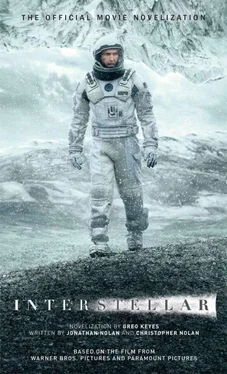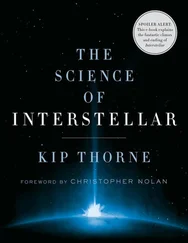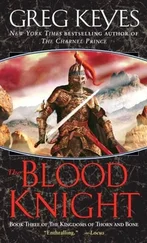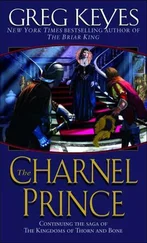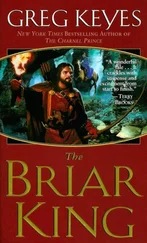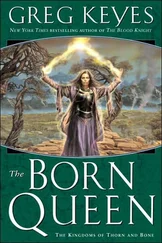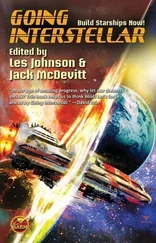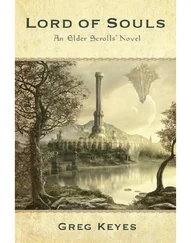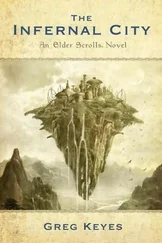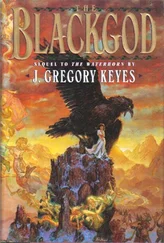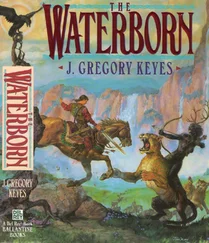“Bullshit,” Cooper said flatly.
“Would you have left, if you hadn’t believed you were trying to save them ?” Mann challenged. “Evolution has yet to transcend that simple barrier—we can care deeply, selflessly for people we know, but our empathy rarely extends beyond our line of sight.”
“But the lie,” Brand said, her voice low and disbelieving. “The monstrous lie…”
“Unforgivable,” Mann agreed. “And he knew it. Your father was prepared to destroy his own humanity to save our species. He made the ultimate sacrifice.”
“No,” Cooper said, feeling the boil, the fury at so ludicrous a claim: that the sacrifice of one man’s reputation rose anywhere near the level of “ultimate.”
“No,” he said grimly. “That’s being made by the people of Earth, who’ll die because in his arrogance, he declared their case hopeless.”
Mann gave him a look, and under other circumstances his expression might have seemed earnest. Now it only seemed condescending.
“I’m sorry, Cooper,” he said. “Their case is hopeless. We are the future.”
Then the bottom dropped out of everything. Cooper realized that he should have known better. He had just been so damned eager to get back into space, he’d been prepared to believe any goddamn thing Professor Brand said.
“I’m asking you to trust me,” he’d said. “When you return, I’ll have solved the problem of gravity. You have my word.”
Brand put a hand on his shoulder, but he didn’t move.
“Cooper,” she said. “What can I do?”
He took a moment.
“Let me go home,” he said.
A muddy dawn filtered through the dusty sky as Murph steered the pickup. Smoke rose in black pillars from burning fields, like offerings to some savage god of old.
“Are you sure?” Dr. Getty asked from the passenger’s seat.
“The solution was correct,” she said. “He’d had it for years.”
“It’s worthless?”
“It’s half the answer,” she said. She saw more dust ahead, probably kicked up by traffic on the road.
“How do you find the other half?” he asked.
She released one hand from the wheel and pointed to the sky.
“Out there?” she said. “A black hole. Stuck here on Earth? I’m not sure you can.”
They were near enough to see the convoy now, trucks and cars piled high with clothes, furniture—whole households of belongings reduced to what a car could hold. Their owners were packed in wherever they could find space.
“They just pack up and leave,” Getty observed in a puzzled tone. “What are they hoping to find?”
“Survival,” she said. Then she saw it—the wall of dust, the black blizzard bearing down on them like an unstoppable juggernaut.
“Dammit!” she said as it rushed over them, eclipsing the road, the empty storefronts and abandoned houses, erasing everything from their sight. Inside of the cloud, it might as well have been night.
She pulled over and turned the engine off. They sat there, the truck rocking in the wind as the dust began trying to bury them in earnest. She remembered another storm—the last one she had been in with her family, before the coordinates appeared on her bedroom floor. She remembered her father’s concentration, his determination to get them home safe.
Murph remembered, too, the validation she had felt after they reached the house, when he saw the pattern, and took it seriously. It had felt like such a victory.
And yet he had never taken the rest of it seriously.
Her ghost.
The books.
How could he have been so selective? she wondered. Why hadn’t he wanted to know what it all meant, rather than focusing on the easy part? But she knew the answer—most likely she always had. He’d only been interested in the part that told him what he wanted to hear: that he had been chosen, that it was his destiny to go into space. He’d kept his focus narrow on purpose, so things would remain simple, and his decision would be easy because it was inevitable.
She wondered, now, if she hadn’t been doing the same thing for years. Was there something she was missing—some bigger picture that had been obscured by her anger? By the hurt of him leaving? Had she trusted the professor so much because she needed to feel she had someone trustworthy in her life? She should have seen what he was up to—or rather, wasn’t up to—years ago. Instead she had blindly bumped her head against his self-imposed barrier for decades. Narrow focus. Keep it simple.
Just like Dad.
It was like the problem with gravity—trying to make the theory of relativity mesh with quantum theory. Both worked fine in describing the nature of the universe, each on a different scale—the very large in the case of relativity, and the very small in quantum theory. But held side by side they seemed contradictory. In the singularity inside a black hole, the two must come together and be merged.
Yet the universe was . It existed, and it worked. Somehow. So the apparent contradiction wasn’t in the physical world—it was the result of imperfect data, a wrong way of looking at things. Faulty equations based on mistaken assumptions.
Her ghost wrote with gravity, pushed books from their shelves with it. Her ghost told her father where to go, how to leave—and then it begged him to stay. Could that contradiction be reconciled, or was one end or the other of that equation just plain wrong?
She had been ten. Maybe the Morse code interpretation had been wishful thinking—an attempt to interpret data the way she wanted it to be interpreted. The floor pattern, after all, had been binary.
And yet Morse was binary, in a way…
“Don’t people have the right to know?” Getty asked, cutting off her ruminations.
She’d thought about that, pondered the lie. But she had also begun to come to terms with it, in a way. Not with the professor himself, but with the illusion he had maintained.
“Panic won’t help,” she said. “We have to keep working, same as ever.”
“Isn’t that just what Professor Brand—?”
“Brand gave up on us,” she snapped, her anger flaring. “I’m still trying to solve this.”
“So you have an idea?” Getty asked.
“No,” she said. “I have a feeling.”
She felt his gaze on her as she stared out into the dust.
“I told you about my ghost,” she said, after a few heartbeats.
She remembered being ten, just out of the shower, her hair wet, a towel around her neck, finding the book on the floor and the broken lunar lander model beside it.
She placed her hand on the car window, watching the dust sleet by, looking for patterns in it. Equations. Morse code. “Murph, you wanna talk science, don’t just tell me you’re scared of some ghost. Record the facts, analyze—present your conclusions.”
“My dad thought I called it a ghost because I was scared of it,” she told Getty. “But I was never scared of it.” She remembered counting the books, drawing lines to represent them. Trying to decode the message—because she knew there was a message.
She turned from the window and regarded Dr. Getty once again. Why was she telling him this? She had mentioned the ghost to him once, but she had left it at that—the story of a childhood mystery. And yet she had never told anyone else even that much. And now she was babbling on…
Maybe it was because he wasn’t a mathematician or an astrophysicist, because the concerns of their work didn’t overlap much. He wouldn’t know when she was stepping from the terrain of the accepted into the terra incognita of La-la Land. Or maybe he was just a good listener. Or it could be because he was here, now, in her little bubble in the dust, and she felt for some reason that there was an urgency about all of this.
Читать дальше
